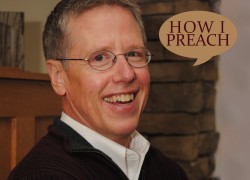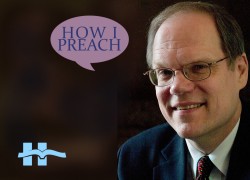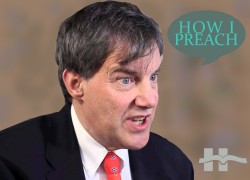aBeLOG
Welcome to the aBeLOG, a series of (hopefully!) fortnightly posts on all matters homiletical. I intend to touch on whatever grabs my attention regarding preaching—issues contemporary and ancient, ideas hermeneutical and rhetorical, personalities conservative and liberal, publications antiquarian and avant-garde. Essentially, I’m going to follow my own homiletical olfactory instincts up rabbit trails and after red herrings. Comments are always invited and appreciated.
Scott Wenig: How I Preach
Scott Wenig: And this is How I Preach …
[Scott, like several of those portrayed in this series, is a fellow Evangelical Homiletics Society (EHS) member, and a fellow teacher of preaching (at Denver Seminary). Thoughtful scholar on all matters homiletical and pastoral, he brings to the pulpit a wealth of experience in leading churches. He has been at Denver for over two decades, and including this stint has been pastoring both in full-time and interim capacities for the
Genesis 18:1−19:38
Failure to keep the way of God results in punishment, but the prayers (and life) of one keeping that way precludes it.
This section is essentially the story of Lot and of Sodom and Gomorrah, with divine justice as a distinct theme.
Abraham’s household is called to be characterized by keeping Yahweh’s way in righteousness and justice, in contrast to the depravity and turpitude characterizing the locale where Lot is situated—described as wicked and evil (19:7, 9). Aligning
Sole Passion!
I was recently interviewed about singleness and celibacy in Dallas Theological Seminary’s quarterly magazine, Kindred Spirit. For the interview see here.
(BTW, the entire issue is focused on “Singles and the Church,” and may be accessed here. Feel free to read, pass on, or otherwise disseminate.)
Also, in conjunction with that issue, another interview of me with my colleague and friend, Dr. Darrell Bock, was posted on Dallas Seminary’s Table Podcast. Darrell
John Koessler: How I Preach
John Koessler: And this is How I Preach …
[John is a fellow Evangelical Homiletics Society (EHS) member, and a fellow teacher of preaching (at Moody Bible Institute). Prolific writer, insightful preacher, with an enviable dry sense of humor, John’s writing and speaking are well worth attending to. Even the papers he presents at EHS, the book reviews and articles he writes for the Journal of the Evangelical Homiletics Society and other journals, and his radio
Genesis 17:1−18:15
God’s blessing upon oneself and one’s associates is conditioned upon a faithful walk before God, a commitment remembered by a formal act of dedication.
It is now thirteen years after the events of Gen 16, and Abram must surely have been wondering when the promise of Yahweh regarding descendants would be fulfilled. The statement of the man’s age, ninety-nine, begins and ends this section (17:1, 24), adding to the tension of the story. More than two decades had passed
Michael Quicke: How I Preach
Michael Quicke: And this is How I Preach …
[Michael and I connected at the Evangelical Homiletics Society several years ago. This Britisher (with both Cambridge and Oxford pedigrees) is a perspicacious writer on matters related to preaching. Before his fourteen years at Northern Seminary, he was principal of Spurgeon’s College, London—the largest Baptist seminary in Europe—for about a decade, tenth in line to C. H. Spurgeon himself! Michael’s pastoral heart, international
Another New Commentary!
This is a rehash of an old post, to announce my new commentary that’s just come out: Ephesians: A Theological Commentary for Preachers.
I’m frequently asked by my students about commentaries I employ in my preaching prep.
The Preacher sought to find delightful words and to write words of truth correctly. The words of wise men are like goads, and masters of these collections are like well-driven nails; they are given by one Shepherd.



















 Abe Kuruvilla is the Carl E. Bates Professor of Christian Preaching at The Southern Baptist Theological Seminary (Louisville, KY), and a dermatologist in private practice. His passion is to explore, explain, and exemplify preaching.
Abe Kuruvilla is the Carl E. Bates Professor of Christian Preaching at The Southern Baptist Theological Seminary (Louisville, KY), and a dermatologist in private practice. His passion is to explore, explain, and exemplify preaching.